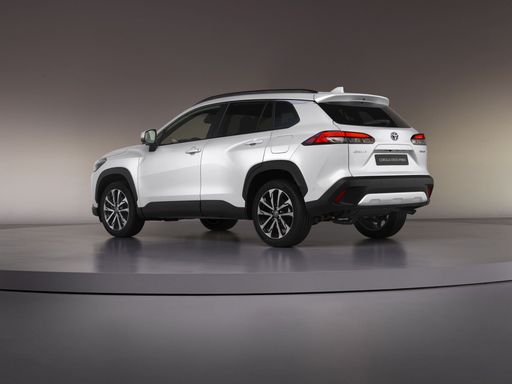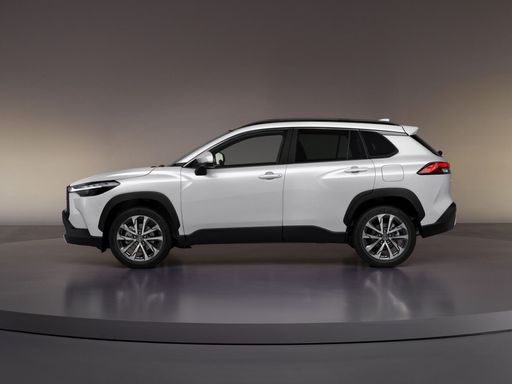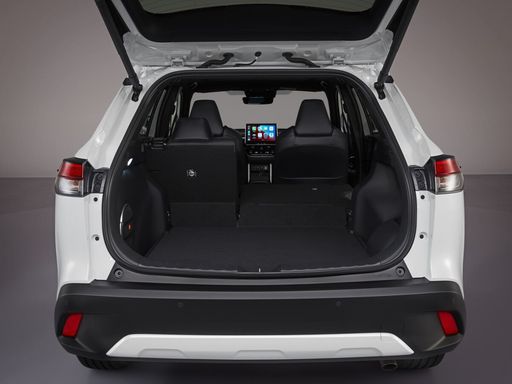Toyota Corolla Cross vs VW Tiguan - Differences and prices compared
Compare performance (180 HP vs 272 HP), boot space and price (31700 £ vs 33300 £ ) at a glance. Find out which car is the better choice for you – Toyota Corolla Cross or VW Tiguan?
Costs and Efficiency:
Looking at overall running costs, both models reveal some interesting differences in everyday economy.
Toyota Corolla Cross has a barely noticeable advantage in terms of price – it starts at 31700 £ , while the VW Tiguan costs 33300 £ . That’s a price difference of around 1595 £.
Fuel consumption also shows a difference: VW Tiguan manages with 1.40 L and is therefore convincingly more efficient than the Toyota Corolla Cross with 4.90 L. The difference is about 3.50 L per 100 km.
Engine and Performance:
Under the bonnet, it becomes clear which model is tuned for sportiness and which one takes the lead when you hit the accelerator.
When it comes to engine power, the VW Tiguan has a clearly perceptible edge – offering 272 HP compared to 180 HP. That’s roughly 92 HP more horsepower.
In acceleration from 0 to 100 km/h, the VW Tiguan is noticeable quicker – completing the sprint in 5.90 s, while the Toyota Corolla Cross takes 7.60 s. That’s about 1.70 s faster.
In terms of top speed, the VW Tiguan performs clearly perceptible better – reaching 242 km/h, while the Toyota Corolla Cross tops out at 180 km/h. The difference is around 62 km/h.
Space and Everyday Use:
Whether family car or daily driver – which one offers more room, flexibility and comfort?
Both vehicles offer seating for 5 people.
In curb weight, Toyota Corolla Cross is somewhat lighter – 1380 kg compared to 1599 kg. The difference is around 219 kg.
In terms of boot space, the VW Tiguan offers distinct more room – 652 L compared to 425 L. That’s a difference of about 227 L.
In maximum load capacity, the VW Tiguan performs a bit better – up to 1650 L, which is about 313 L more than the Toyota Corolla Cross.
When it comes to payload, Toyota Corolla Cross hardly perceptible takes the win – 560 kg compared to 533 kg. That’s a difference of about 27 kg.
Who wins the race in the data check?
The VW Tiguan sits well ahead of its rival in the objective data comparison.
This result only shows which model scores more points on paper – not which of the two cars feels right for you.
Costs and Consumption
View detailed analysis
Engine and Performance
View detailed analysis
Dimensions and Body
View detailed analysis

VW Tiguan
Toyota Corolla Cross
The Toyota Corolla Cross takes the familiar Corolla recipe, lifts it up and dresses it in SUV clothes — sensible, comfortable and blessedly unflashy. It won’t thrill the enthusiast, but its easy manners, clever packaging and dependable feel make it an ideal everyday car for shoppers who prefer sense over sass.
details




VW Tiguan
The VW Tiguan blends sensible family practicality with a dash of German polish, delivering a calm, reassuring ride and a cabin that never feels like an afterthought. For buyers who want an SUV that’s easy to live with yet still nicely dressed, the Tiguan is the grown‑up choice that keeps a cheeky wink in reserve.
details





Costs and Consumption |
|
|---|---|
|
Price
31700 - 41900 £
|
Price
33300 - 51900 £
|
|
Consumption L/100km
4.9 - 5.3 L
|
Consumption L/100km
1.4 - 8.4 L
|
|
Consumption kWh/100km
-
|
Consumption kWh/100km
-
|
|
Electric Range
-
|
Electric Range
118 - 126 km
|
|
Battery Capacity
-
|
Battery Capacity
19.70 kWh
|
|
co2
112 - 120 g/km
|
co2
32 - 190 g/km
|
|
Fuel tank capacity
36 - 43 L
|
Fuel tank capacity
45 - 58 L
|
Dimensions and Body |
|
|---|---|
|
Body Type
SUV
|
Body Type
SUV
|
|
Seats
5
|
Seats
5
|
|
Doors
5
|
Doors
5
|
|
Curb weight
1380 - 1500 kg
|
Curb weight
1599 - 1890 kg
|
|
Trunk capacity
414 - 425 L
|
Trunk capacity
490 - 652 L
|
|
Length
4460 mm
|
Length
4539 mm
|
|
Width
1825 mm
|
Width
1842 - 1859 mm
|
|
Height
1620 mm
|
Height
1656 - 1658 mm
|
|
Max trunk capacity
1333 - 1337 L
|
Max trunk capacity
1486 - 1650 L
|
|
Payload
515 - 560 kg
|
Payload
460 - 533 kg
|
Engine and Performance |
|
|---|---|
|
Engine Type
Full Hybrid
|
Engine Type
Petrol, Petrol MHEV, Diesel, Plugin Hybrid
|
|
Transmission
Automatic
|
Transmission
Automatic
|
|
Transmission Detail
CVT
|
Transmission Detail
Dual-Clutch Automatic
|
|
Drive Type
Front-Wheel Drive, All-Wheel Drive
|
Drive Type
All-Wheel Drive, Front-Wheel Drive
|
|
Power HP
140 - 180 HP
|
Power HP
130 - 272 HP
|
|
Acceleration 0-100km/h
7.6 - 10 s
|
Acceleration 0-100km/h
5.9 - 10.6 s
|
|
Max Speed
170 - 180 km/h
|
Max Speed
210 - 242 km/h
|
|
Torque
-
|
Torque
220 - 400 Nm
|
|
Number of Cylinders
4
|
Number of Cylinders
4
|
|
Power kW
103 - 132 kW
|
Power kW
96 - 200 kW
|
|
Engine capacity
1798 - 1987 cm3
|
Engine capacity
1498 - 1984 cm3
|
General |
|
|---|---|
|
Model Year
2025
|
Model Year
2024 - 2025
|
|
CO2 Efficiency Class
C, D
|
CO2 Efficiency Class
G, D, E, F, B
|
|
Brand
Toyota
|
Brand
VW
|
Is the Toyota Corolla Cross offered with different drivetrains?
Available configurations include Front-Wheel Drive or All-Wheel Drive.




